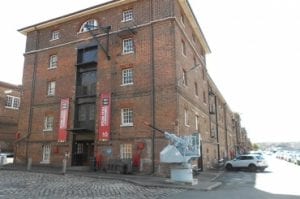 The South East Local Enterprise Partnership (SELEP) has approved an £800,000 loan towards an £8.4million project to convert of a Grade I listed building at Chatham Historic Dockyard, a project that will help retain 300 jobs in Medway.
The South East Local Enterprise Partnership (SELEP) has approved an £800,000 loan towards an £8.4million project to convert of a Grade I listed building at Chatham Historic Dockyard, a project that will help retain 300 jobs in Medway.
The Growing Places Fund investment in the project will go towards the conversion of the Fitted Rigging House into 3,473m2 of office space for use by three growing businesses.
Two of those businesses are already located at the Historic Dockyard but need room to expand. Without the new space being created it is likely they would have moved out of the Medway area, taking 300 jobs with them.
The Chatham Historic Dockyard Trust will relocate its own offices to the refurbished building, freeing up space in its current home to enable the University of Kent’s Business School to expand and create a postgraduate study centre.
Geoff Miles, Kent Vice Chair of SELEP and Chair of the SELEP’s Accountability Board said “This project forms a critical element of Chatham Historic Dockyard Trust’s corporate plan based on a strategy of preservation through re-use that generates income to maintain the 80 acre heritage site. “The investment will help the wider Historic Dockyard Chatham become financially self-sustainable. This helps secure the site for 170,000 visitors per year.”
The remainder of the project cost is being funded through charitable trusts and foundations and other statutory bodies.
Geoff Miles added “The Fitted Rigging House is a great example of the type of project the Growing Places Fund is designed to support. It will help grow the Historic Dockyard’s contribution to Medway’s local visitor economy, which already stands at around £16m a year.”
Fitted Rigging House – Business Case
The Fitted Rigging House Project (FRH) will convert a large, Grade 1 former industrial building into office and public benefit spaces initially providing a base for 3 organisations employing over 350 people and freeing up space to create a postgraduate study facility elsewhere onsite for the University of Kent’s Business School.
![]() Fitted Rigging House Business Case
Fitted Rigging House Business Case
About the Growing Places Fund
 The Growing Places Fund (GPF) was established by the Ministry for Housing, Communities and Local Government (formerly the Department for Communities and Local Government) and the Department for Transport (DfT) in 2011. The aim of this funding is to unlock economic growth, create jobs and ‘kick-start’ house building at stalled development sites.
The Growing Places Fund (GPF) was established by the Ministry for Housing, Communities and Local Government (formerly the Department for Communities and Local Government) and the Department for Transport (DfT) in 2011. The aim of this funding is to unlock economic growth, create jobs and ‘kick-start’ house building at stalled development sites.
Through the GPF Round 1 awards, a total of £48.705m GPF was awarded to 13 capital infrastructure projects across the LEP area.
Recycled loan scheme
GPF works as a recycled loan scheme regenerating funds based on the repayment schedules agreed for projects already financed.
Projects are identified by SELEP Federated Boards as meeting the GPF eligibility criteria aligning with the following five themes:
- Employment and Skills
- Job creation and Enterprise Zones
- Homes, Communities and Culture
- Strategic Connectivity
- SELEP Sector Group Activities including Transport & Strategic Infrastructure, Coastal Communities, Creative, Growth Hub, Housing, Rural, Skills (Further Education and Higher Education) and Tourism.
The Accountability Board – democratic decision making
All formal democratic decision-making is through the Accountability Board which approves all funding decisions and monitors and manages SELEP’s capital programme for greatest impact, informed by local area management information.
The joint committee structure of the Accountability Board roots decision-making firmly in the democratic process and enables it to be subject to democratic scrutiny.
The Board comprises of nine members, including six voting members from the SELEP upper tier authorities, along with a further three non – voting representatives from Further Education, Higher Education and the Business Community.